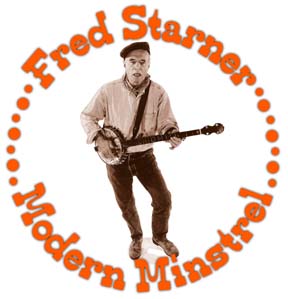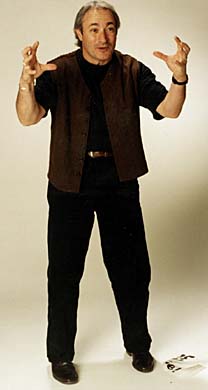|

COVER
STORY | IN THE NEWS | GARDEN | EDITORIAL | THE HUM | CALENDAR
OPENING NIGHT
Jeff DeMark expects the unexpected
by AMY
STEWART

by BOB DORAN

FRED STARNER IS NOT REALLY A
HOBO, ALTHOUGH HE sees himself as a hobo minstrel. But when you
spend a while talking with him, you learn that he loves to ramble.
Ask him a question and he'll drift off into tales of this or
that, be it something about the trials and tribulations connected
with life in the uptight world of academia, or a story of some
famous hobo like Road Hog, a King of the Hobos who held up a
bank so he could get a prison doctor to look into what turned
out to be imagined medical problems. "I play in a lot of
retirement homes and they like that song because they sympathize
with somebody who doesn't have Medicare," he told me, when
I tracked him down at his home in the Northridge section of Los
Angeles.
Starner had just returned from
Folk Alliance, a massive gathering held this past weekend in
San Diego, where thousands involved in folk music swapped songs
and CDs, trying to line up gigs or book festivals. Fred says
he was involved in Folk Alliance from its beginning 16 years
ago. "It was put together by the Weissmans, a couple who
started a Southern California folk music society. They brought
together anybody who was anybody in the world of folk music.
The idea was to wave the flag for folk music and folklore, folk
dancing and storytelling; to help people get grants and set up
a clearinghouse for like-minded performers with a list of venues,
contacts for radio and later the emerging Internet; anything
that might relate to sustaining and legitimizing folklore in
the broadest sense."
Folk music had been a side career
for Starner long before that, since the end of the '60s. "I
made my living in academia; I just retired after 32 years of
teaching economics. I taught at Drew University in New Jersey,
and a few other places. I was kicked out of Drew because of my
association with Pete Seeger and the Clearwater [a schooner Seeger
and friends restored to promote environmental consciousness on
the Hudson River]. I was on the original singing crew of the
Clearwater along with Don McLean and a few others. That finished
me at Drew; the [Vietnam] war was heating up and here was Pete
at the front of the anti-war movement. There was no environmental
movement to speak of, but here I was an economist criticizing
corporations. The conservative faculty members were horrified."
Ousted from Drew, he landed
at the University of Wisconsin in Madison and continued his duel
career: He was the campus' resident alternative economist when
he wasn't picking banjo tunes or organizing folk festivals. A
government grant in support of folk music again put him at odds
with the academics, this time with a music prof who thought the
money would be best spent studying "real folk music,"
for example, Scandinavian fiddle styles.
"The academics do not consider
Dylan, Woody Guthrie or Pete Seeger to be folk musicians. For
them a folk song is a sociological concept: oral songs transmitted
from mouth to mouth, like mononucleosis or something. They want
to preserve `folk' as this antique expression -- button accordions
and dance music, all that stuff. I'd say there's a place for
both, for the folksingers, and the button accordion players and
Swedish dancers."
Starner says the same old controversy
about the nature of folk music is found at events like Folk Alliance,
even though the songwriters are now dominant. "At this point
the songwriters outnumber the traditionalists on the board and
at the festival probably three to one," he said. "Two
of the biggest showcases were ASCAP and BMI, both featured songwriters,
and of course they had no relation to traditional folk philosophies,
storytelling, family song and so forth."
Starner's music mixes it all
up. He might start with a centuries-old murder ballad, then shift
into a song based on current events. "I'm tickled to be
in this thousand year tradition of `folk' where people express
stories and views in song. This goes all the way back to the
minstrel. The medieval minstrel was something like a folksinger:
They were entertainers, but they told the news of the day, and
some of it was controversial. In the Battle of Hastings King
Henry II was antagonized by a French minstrel, Luke de Barre.
When they caught him he was executed, that was in 1100 in England.
"I'm not saying folk music
is always antagonistic against the establishment, but that is
a branch on the tree of folklore. In America in the last hundred
years we had the Hutchinson family, who were Abolitionists and
sang songs about abolition before the Civil War. It ran through
Joe Hill and the labor movement, then later on to Woody Guthrie
and Pete Seeger. All of them used humor as part of their spiel.
"My latest songs have been
about Iraq; I have one about the bordellos over there, inspired
by a newspaper story I read. But in a typical evening I'll only
do a couple of serious political songs, the rest are other people's
songs, folklore, stories, banjo history. Up there of course I'll
do my Julia Butterfly song, if I can remember the words; I don't
sing it that much. And I always do some hobo songs.
"Basically I'm a folksinger
who sees himself in this stream of history of expression of folklore
through music that goes back 1,000 years. Although I write songs,
I'm not really part of the modern songwriter tradition, I'm more
like the minstrels of old."
Fred Starner brings his
banjo and his guitar to Sacred Grounds this weekend, playing
shows Friday and Saturday, March 5 and 6, beginning at 8 p.m.
For more on Starner, go to home.earthlink.net/~fstarner.
Bob
Doran

Jeff DeMark expects the unexpected
JEFF DEMARK [photo at left] BELIEVES
IN LUCK, AND HE believes in fate. He told me that a couple of
weeks ago when I had him over for a drink and an interview. As
he sat in an armchair in my living room, he shook a chain of
lucky charms he wears under his shirt. "These are always
with me," he said.
His latest show, Hard as
a Diamond, Soft as the Dirt, which he will be performing
as a benefit for KHSU this weekend, hangs on a moment of fate
-- and, perhaps, a question of faith.
"I took this trip to Tiger
Stadium after my father's death as a kind of ritualized way of
saying good-bye to him," he told me. "He'd always been
a Tigers fan. I thought that if I could just be there, with the
right intention, maybe something would happen, something magical.
But I couldn't force it." Something did happen when he got
to Tiger Stadium. I won't give it away, but that journey is a
crucial moment in the interwoven stories about baseball and his
father that make up the Diamond show.
Jeff continued, "The stories
that I'm drawn to are coincidences, things that just happen in
the moment, that you can't plan. I've always believed that those
kinds of coincidences, when they come together, can lead to an
alternate reality. I look for those stories, but that's just
it. You can't go looking for them. They have to happen by themselves."
Those strange and magical moments
are the hallmarks of Jeff's monologues, which are at the same
time deeply personal and surprisingly universal. His stories
about adolescence, his college experience during the Vietnam
war, substitute teaching, temp jobs, and -- now -- baseball and
his father's death -- strike a chord in audiences. At the end
of nearly every sold-out show (and I've learned the hard way
that his shows do sell out, so buy your tickets early), someone
comes up to him with a story to share.
"One of the big reasons
I keep on doing the shows are the intangible rewards I get from
people," he said. "It's quite humbling to know I've
reached their hearts. I never imagined I would get so much back
from writing and performing. And people bring me things -- I
never expected that. Classic baseball cards, books, a catcher's
mask, a bat, and one time a beautiful old mitt used by someone's
grandfather who played in the minor leagues."
His monologues are often about
family, but that's not the only thing that make his shows a family
eventwhen he can book the Delta Nationals, his twin brother Paul,
the band's drummer, performs onstage with him. I asked Jeff if
storytelling runs in his family.
"Oh yeah," he said.
"Paul's a good storyteller, too. But my brother Mike, who
lives in Minneapolis, is unbelievable. I always defer to Mike.
When he's around, I don't even try to tell a story. And my dad
-- well, I talk in the show about how his friends used to say,
`No stories from before 1940,' or `No baseball stories,' but
in spite of those rules, my dad would always have a story anyway.
He was this very subtle person, very unpretentious. He always
told stories around the dinner table when we were kids, but he
was never showy."
That DeMark storytelling gene
led Jeff to take to the stage after he saw Bob Dylan touring
with The Band in 1974. "I was just on fire after that show,"
he said. "I'll never forget it. It was electric. I walked
around afterwards and just kept thinking, `I've got to do
something.'" Since then, he's organized poetry readings,
taken acting classes, and in the last 10 years he's developed
a monologue style that seems to resonate with audiences wherever
he goes.
The question of where to go
is never an easy one. Jeff knows that taking his show on the
road would be the only way he could make a living as a performer,
and he's not ready to do that full time, so his motivation has
to be less about money and more about the intangible rewards
-- the lucky moments, the fateful twists.
"I haven't really tried
that hard to work out of the area," he said, "because
I have a job and a family and kids like everybody else. And you
know, that's one reason I keep performing. The only thing different
about me is these shows. I'm not extraordinarily eccentric, but
these shows are like an adventure. I go out to some place like
Petrolia with my friend Jerry who does the sound for me, and
we're looking for something to happen that night. When I do my
show, I'm hoping for the oddball thing, something in the moment,
that kind of crazy shit that goes down when you're on stage live.
"So I do these shows in
Westhaven, and at the Coffee Break, and sometimes a big show
like this one at HSU, and I just want the magical thing to happen.
And it does. These shows have changed my life. Doing them is
like a state of grace, it really is."
Jeff DeMark performs Hard
as a Diamond, Soft as the Dirt Sunday, March 7, in HSU's
Kate Buchanan Room. Doors open at 5:30 for a reception and a
Dutch auction of baseball tickets, memorabilia and other items
from local businesses and restaurants benefiting KHSU-FM. The
Delta Nationals will perform, and proclamations from HSU President
Rollin Richmond will be presented to the Humboldt Crabs in honor
of their upcoming 60th season, and to Frank Cheek, coach of the
HSU women's softball team. DeMark's show begins shortly after
7 p.m. Tickets are $10, $5 for students and seniors. Call 826-3928
for reservations.
COVER
STORY | IN
THE NEWS | GARDEN | EDITORIAL | THE HUM | CALENDAR
Comments?

© Copyright 2003, North Coast Journal,
Inc.
|